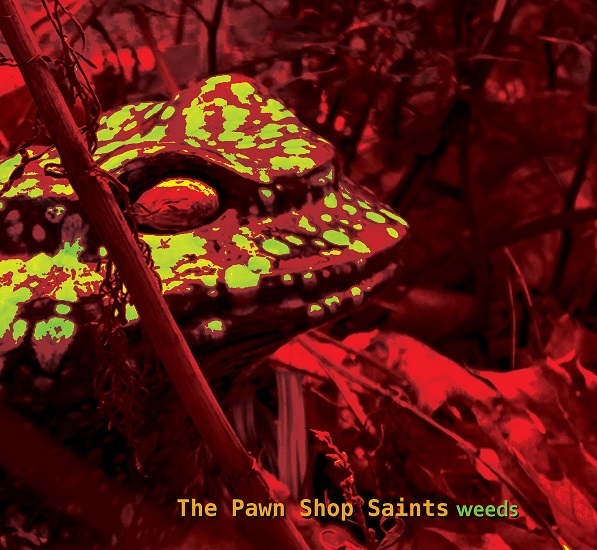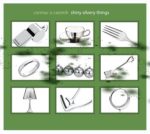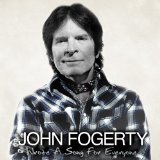
Paddy McAloon described the working title of his 1990 Prefab Sprout masterpiece ‘Jordan: The Comeback’ as ‘Death and Elvis’. Jeb Barry could have had a working title of ‘Death and Death’ for his third pandemic album ‘Weeds’. Jeb’s inclination is naturally towards the melancholic and the album centres around the impact of COVID and the impact of the death of John Prine in particular, so don’t expect too many laughs. The songs are beautifully constructed miniatures with sparse arrangements built around acoustic guitar and bass with additional colour from occasional accordion, banjo, harmonica and fiddle solos and fills. The production, co-helmed with long-time collaborator Josh Pisano has a very organic live folk feel, keeping Jeb’s vocal front and centre and sometimes doubled up to reinforce its plaintive, keening quality. Across the album, Jeb’s voice emphasises and accentuates the painful subjects of the songs.
The opening song on ‘Weeds’ is almost cheerful in that it’s only about a break-up rather than a death. It’s the album’s obligatory Big Star-ish song and comes complete with an accordion solo; from there on, things get a bit darker, apart from the slide guitar-punctuated title song which talks about the metaphorical weeds we trip over before the song turns to positivity with angels watching over us.
Most of Jeb Barry’s songs are Carver-style vignettes, picking up on small events in people’s everyday lives. The death of ‘Miss June’ echoes the lonely death of the more famous ‘Eleanor Rigby’, while ‘Preacher’ and ‘All Girls Break Hearts’ are fairly straightforward stories of broken romances. The really punchy songs for me on ‘Weeds’ are the ones where personal stories are intertwined with social or political themes.
‘The COVID Unit’ combines the idea of losing people to the virus with the selfishness or stupidity of people refusing to wear masks over a mid-tempo country rock arrangement while ‘Generation Lockdown uses a similar styling to combine themes of lockdown and its impacts with the other American virus of school shootings, which is particularly relevant as Jeb’s day job is teaching high school. There’s a gentle power in every song on the album; ‘The War’ is an exploration of PTSD, ‘James’ deals with coping with the untimely death of an old friend, while ‘Twine’, a song about barely holding things together, is a tribute to John Prine.
Jeb Barry describes ‘Seeds’ as his folk album. The arrangements are mainly traditional string band stylings and there are elements of protest in the songs as well. There are many fascinating stories, all sung in Jeb’s laconic, fragile high tenor with arrangements that rely on feel and skill rather than power and clever studio techniques. It’s organic without descending into lo-fi territory. Every song fits in neatly, even the singalong (shoutalong?) simplicity of ‘Baby Got Drunk’. There are stories and messages aplenty and you can’t beat an album that begins with a song that’s a tribute to Alex Chilton.
‘Weeds’ is released in the UK on Dollyrocker Records (DR20231) on Friday July 21st.
 So where would you start if you wanted to assign a label to Cormac O Caoimh? It’s so diverse you would need a bucketload of tags and then you’d spend hours agonising over which order to put them in. Life’s too short, so let’s just go for eclectic. If you take the melodic romanticism of Paddy McAloon and throw in a bit of Neil Hannon’s Gaelic whimsy, you might begin to grasp the completely original sound of Cormac O Caoimh. Prefab Comedy or Divine Sprout? You decide; either way, there are twelve beautifully-crafted songs here that are set like jewels in arrangements and stylings that transform them into, well, “Shiny Silvery Things”.
So where would you start if you wanted to assign a label to Cormac O Caoimh? It’s so diverse you would need a bucketload of tags and then you’d spend hours agonising over which order to put them in. Life’s too short, so let’s just go for eclectic. If you take the melodic romanticism of Paddy McAloon and throw in a bit of Neil Hannon’s Gaelic whimsy, you might begin to grasp the completely original sound of Cormac O Caoimh. Prefab Comedy or Divine Sprout? You decide; either way, there are twelve beautifully-crafted songs here that are set like jewels in arrangements and stylings that transform them into, well, “Shiny Silvery Things”.
There’s poetry and mysticism in the lyrics throughout the album and the musical settings range from the lush strings and gorgeous choral harmonies of “Silence and Sound” to the jazz swing and rich baritone vocal of the title track, to the spiky guitar fills packed with accidentals (or should that be deliberates) and free-form jazz sax of “A Parked Car”. And there’s more guitar atonality in “In the Hollow of an Old Oak”, the slightly sour tone contrasting with the spirituality of the lyrics. Along the way, there are a few more gems. “Proud” roars in with an intro that’s somewhere between “Get Back” and “David Watts” before Cormac launches into a one-man call and response vocal, and the gentle “Tea in my Teacup” emphasises the value of the simpler things in life as an antidote to the complicated world outside.
The comparisons with Prefab Sprout are impossible to avoid; every melody’s an earworm, the lyrics are poetic and thought-provoking (there’s even an Atlantis reference) and Aoife Regan’s vocals have more than a hint of Wendy Smith, but there’s also a Gaelic twist to the album that gives it a unique character. Sublime.
“Shiny Silvery Things” is released on Friday April 28.
 So, what’s this all about then? John Fogerty, former Creedence Clearwater Revival frontman and highly respected solo artist has decided to revisit some of his back catalogue with a few collaborators and throw in a brace of new songs for good measure. It’s not a new idea and it can be either a cynical attempt to cash in on a few good, old songs or a chance to invite fellow musicians to put their stamp on your songs. I’m really pleased to say that “Wrote a Song for Everyone” is a fascinating look at the heritage of one of the great rock songwriters and performers. You have to approach this with an open mind; some of the songs, in their original incarnations, were massive teenage favourites of mine through happy and sad times but there are some radically different interpretations here. The conventional view is that Eagles popularised the country-rock genre, but you could make the same case for Creedence if you take your country influences from New Orleans rather than Bakersfield; just a thought.
So, what’s this all about then? John Fogerty, former Creedence Clearwater Revival frontman and highly respected solo artist has decided to revisit some of his back catalogue with a few collaborators and throw in a brace of new songs for good measure. It’s not a new idea and it can be either a cynical attempt to cash in on a few good, old songs or a chance to invite fellow musicians to put their stamp on your songs. I’m really pleased to say that “Wrote a Song for Everyone” is a fascinating look at the heritage of one of the great rock songwriters and performers. You have to approach this with an open mind; some of the songs, in their original incarnations, were massive teenage favourites of mine through happy and sad times but there are some radically different interpretations here. The conventional view is that Eagles popularised the country-rock genre, but you could make the same case for Creedence if you take your country influences from New Orleans rather than Bakersfield; just a thought.
The album opens with “Fortunate Son”, which is amped-up by the Foo Fighters to a full-on rocker (no surprise there) before Keith Urban delivers a banjo-led country-rock version of “Almost Saturday Night” which takes the song back to its lyrical roots and “Lodi” (probably my favourite John Fogerty song) gets the Status Quo “Rocking All Over the World” treatment with John’s two sons Shane and Tyler Fogerty. Incidentally, this is the only collaboration that Fogerty arranged, pulling rank with his two sons when he didn’t like their country-rock arrangement. “Mystic Highway” is one of the new songs and breaks down into 3 sections, the main song, an instrumental section and an a capella breakdown with a strong feel of the Doobie Brothers “Black Water”. “Wrote a Song for Everyone” features a Miranda Lambert vocal and some exceptional guitar work from Tom Morello; so far so good.
The Zac Brown Band reworking of “Bad Moon Rising” in a Cajun style works less well for me, losing the brooding menace of the original version. “Long as I can See the Light” with My Morning Jacket sticks fairly close to the original, retaining the organ riff which characterises that version and is followed by Kid Rock’s take on “Born on the Bayou”. Apparently it’s now a violation of several federal statutes to record a collaboration album without including a Kid Rock track. The album’s second new song “Train of Fools” follows, exploring similar territory to Springsteen’s recent “Land of Hope and Dreams”. It’s obvious that John Fogerty can still write a good song and the new songs sit very comfortably alongside his earlier work on this album.
“Someday Never Comes” with Dawes has Taylor Goldsmith singing the verses about the things we tell kids (and adults) to shut them up while Fogerty takes the choruses as the gruff old bad guy who tells us that it’s all lies. Bob Seger delivers the Woodstock song “Who’ll Stop the Rain” very much in the style of his 1976 classic “Night Moves”, which works very well. If any singles are to be released from the album, “Hot Rod Heart” should be top of the list. It’s a great driving song (maybe it’s time we had an alternative to the lazy radio programming of Don Henley’s “The Boys of Summer” every time the sun shines for more than five minutes) and the last couple of minutes consists of Fogerty and Brad Paisley trading superb guitar solos and generally having a good time. I bet Paddy McAloon wouldn’t like it.
“Have You Ever Seen the Rain” with Alan Jackson works perfectly with a pure country arrangement with banjo, fiddle and steel guitar filling out the sound and leads us into the last track of the album. I’ve heard many versions of “Proud Mary”, but nothing quite like this. The first verse and chorus are pure gospel with Jennifer Hudson backed by a gospel choir and the wonderful Allen Toussaint before speeding up to a Cajun boogie with the full band and accordion and horns for good measure. I used to think the Ike & Tina Turner version was over the top, but they only used one kitchen sink and I think there’s about three here. It’s a glorious way to end a great album.
John Fogerty has survived in the music business for a long time with all of the usual peaks and troughs that anyone big in the sixties and seventies went through including the publishing disputes, particularly the publishing disputes. The reason he’s still around is that he loves what he does and he’s very good at it. “Wrote a Song for Everyone” is a very, very good album.
Out now on Vanguard (88765487152).


